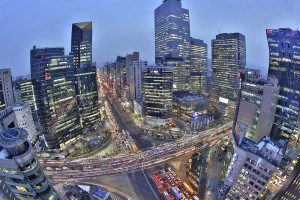Special to WorldTribune.com
By Donald Kirk, East-Asia-Intel.com
SEOUL — The word “trilateral” has a certain allure among those in search of ways to pull disparate nations or regions together. A group of three might cooperate while a group of two might form an alliance and fight the third one, the odd man out. Rather than fight, let’s look for common ground and live happily ever after.

That’s what led to the first great trilateral scheme, the Trilateral Commission, set up more than 40 years ago with members drawn equally into a European group, a North American group and an Asia-Pacific group.
If the commission is unknown beyond an elite of diplomats and bureaucrats, that’s not for lack of trying. They meet in their own regions and across regions, talking up opportunities for peace and goodwill in a world torn by wars, crises and rumors of war. Who’s listening, though, is another matter.
For an idea of how useless some of this yakking can be, look at what they call “trialogues,” reports on their annual meetings. “Seeking Opportunities in Crisis: Trilateral Cooperation in Meeting Global Challenges,” is the title of the most recent one.
If the title provides a clue, I doubt it offers much more than whatever a reasonably bright student might set down if told to write on the topic as an exam question.
This example of “trilateral” cooperation may have been an inspiration for a stab at trilateralism in northeast Asia. Wouldn’t it be nice if experts from China, Korea and Japan all got together and talked about ways to be nice to one another rather than come out with the usual innuendos, rhetorical attacks and scare tactics?
Yes, of course, and why not hire a staff to make it all happen? Thus the Trilateral Cooperation Secretariat was launched three years ago with a fancy office in central Seoul, paid for by the governments of China, Korea and Japan.
A great theme of this effort at cooperation is that the sponsoring countries, protagonists in a great regional power struggle, should come together in a burst of regional pride. “The Unity in Diversity — Fostering East Asian Identity & Spirit of Community” — was the title of a day-long talkfest this week in Seoul. “Wisdom of Integration — When Northeast Asia Encounters the West” was the topic of one session. “In Face of Uncertainty and Calling for New Thinking,” was another.
You can’t exactly accuse the organizers of evil intentions, but the gulf between the lofty ideals inherent in such topics and the reality is overwhelming. You wonder how such an organization can justify its existence. The legacy of history weighs heavily in all the disputes, large and small, that endanger peace in the region.
What can this venture in “trilateral cooperation” do to resolve China’s claims to the Senkaku Islands, held by Japan? And how can such a show of cooperation combat the strident propaganda of hatred seen and heard in the media of these countries? Which is harsher — anti-Japanese diatribes from China and Korea or anti-Chinese and anti-Korean diatribes from Japan?
The president of China Foreign Affairs University, Zhao Jinjun, got it right when he observed at the conference, “Due to historical and realistic reasons, the three countries are yet to foster a Northeast Asian identity.” Indeed, he said, “There still exist certain political forces and views that are against trilateral cooperation.”
That’s probably an understatement. Japan’s Prime Minister Shinzo Abe and China’s President Xi Jinping may not want go to war, but they’re coming close in the standoff over the Senkakus, which the Chinese call Diaoyu. Nor do Japan and South Korea and China appear likely ever to get together on what their textbooks teach about World War II. As for the comfort woman debate, many Japanese prefer to accept the view that the women were prostitutes who knew what they were doing.
Instead of regional trilateral bonds, the word “trilateral” comes up more often in U.S. efforts to bring Japan and South Korea together. When President Obama got Abe and Korea’s President Park Geun-Hye to sit down and talk to one another during a nuclear security summit in The Hague last month, he appeared as a peacemaker between warring parties.
“Stabilization is the key that everyone worries about,” said Kent Calder, a Johns Hopkins professor invited to Seoul by the Trilateral Cooperation Secretariat. “There’s a danger of a cycle of mutual recrimination between China and Japan and between Japan and the ROK (Republic of Korea).”
Hanging over all these discussions is North Korea. Does “trilateral cooperation” mean China, Japan and South Korea should work in unison to rein in the North? China, Japan and South Korea have their own separate agendas. Failure to cooperate on North Korea, more than anything else, is likely to blow up the trilateral mystique.
Columnist Donald Kirk one way or another has been covering the trilateral standoff in Northeast Asia for decades. He’s at kirkdon@yahoo.com.

You must be logged in to post a comment Login